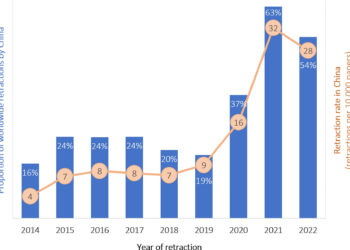
A few weeks ago, I posted about a pair of lawsuits brought by Edwin Mellen Press (EMP) against Dale Askey, an academic librarian, and his employer, McMaster University. Prior to joining McMaster, Askey had written a blog posting critical of the press, characterizing its output as “marginal scholarship” and its prices as “egregiously high.” The press took exception to Askey’s posting and sued both Askey and McMaster for defamation.
On 4 March, EMP announced its intention to “discontinue” the lawsuit that names both McMaster University and Dale Askey. (The other suit, naming Askey as an individual respondent, remains in play as of this writing.)
In my posting I described a phone conversation I’d had with EMP’s owner in 2012, calling it “easily the strangest phone conversation I’ve ever had with a publisher.” I can now say that EMP’s announcement is one of the strangest press releases I’ve ever read.
First of all, the announcement leads with the assertion that “The Edwin Mellen Press is a scholarly publisher. This has been confirmed in a recent Open Letter to the Scholarly Community posted on the web by the Association of Canadian University Presses.” The letter to which EMP refers is well worth reading. It’s true that the letter refers to EMP as a “scholarly publisher.” But here is the paragraph in which that characterization occurs:
We find it distressing that a scholarly publisher such as The Edwin Mellen Press would use the courts to attempt to silence comment and criticism from our customers. Freedom to speak and comment is a core value to which all publishers owe their allegiance.
It is abundantly clear that the point of ACUP’s open letter was not to confirm or defend EMP’s character as a reputable scholarly publisher; on the contrary, it was to defend Askey’s posting as “the views of an experienced and professional university librarian” and his expressed views as “fair comment,” and to call on EMP to stop persecuting Askey for engaging in legitimate criticism. In other words, having been castigated publicly for behaving in a manner fundamentally antithetical to scholarship and freedom of expression, EMP then deliberately drew the public’s attention to that criticism and attempted to characterize it as “confirmation” of its scholarly status. This is simply bizarre.
Another strange feature of EMP’s press release is its repeated reference to a “social media campaign” against it. It is true that contributors to the blogosphere, Twitter, newspapers, professional journals, and listservs responded with outrage to EMP’s lawsuits, and that Askey (along with many of his friends and supporters) called on the scholarly community to come to his aid — given the issues at play, this seems neither surprising nor uncalled-for. But EMP seems to be suggesting that this widespread public response constituted a “campaign” orchestrated in some kind of centralized way — and, even more oddly, asserts that “the Association” (i.e., ACUP, the very group whose letter EMP had just cited in support of its status as a legitimate scholarly publisher) “and others” were behind it. The press clearly feels ill-treated by this public reaction; “EMP is a small company,” it says in the announcement, while complaining about the “severe pressure” that this “campaign” had put on both the press and on unidentified “authors.” (Is EMP “small”? Yes, but not as small as Askey — and it was EMP, not Askey, who brought suit demanding millions of dollars.)
Last of all — and bearing in mind EMP’s complaints about a “campaign” against it in the social media — consider this downright weird development: when I wrote about the lawsuits last month, one reader (using the name “Thomas Anthony Kelly”) posted a comment to the effect that he found “this whole debate to be nuts.” He argued that when it comes to scholarly books, “the… publisher is no indication of quality” (No indication? Really?) and stated furthermore that he knows of “some excellent books published by EMP which have excellent reviews in leading scholarly journals.” Fair enough — except that this same person had apparently posted the same comment, verbatim, to literally hundreds of blogs, news outlets, and other websites that reported on the lawsuits. Once this fact was pointed out publicly by another Kitchen commenter, “Thomas Anthony Kelly”‘s comments on other pages began disappearing; as of this writing, Google search results indicate that only five instances of that comment remain. Now, I’m not sure how comprehensively Google searches older comments — it may be that all of these deletions have simply happened as more-recent comments on the sites pushed the “Kelly” comment off-screen. But if “Thomas Anthony Kelly” is really a single person, then he is clearly both an exceptionally industrious one and a very dedicated fan of EMP. If he is also the one responsible for mass deletions of his comment, then one has to wonder whether he has a day job.
Many of us in the scholarly community will be very happy to learn that EMP has “discontinued” its suit against McMaster and Askey. However, the suit against Askey himself is still active. Now that McMaster University is no longer under direct threat, one can only hope that it will offer practical and concrete support to Askey if the suit against him continues to move forward. And anyone who sees EMP’s continued action as an affront to academic (and personal) free speech may want to say so publicly. I know I do.
Discussion
9 Thoughts on "One Down, One to Go: Edwin Mellen Press Blinks One Eye"
An update — apparently McMaster is going to cover Askey’s legal costs:
GO RICK! We need to all be sure and support Dale however we can do so.
The appropriate ending to this remaining lawsuit would be for the court to find it frivolous and require the plaintiff to pay all of the defendant’s legal costs.
“Thomas Anthony Kelley” also edited the Edwin Mellen Press Wikipedia article with similar content: clicking the “diff” links in this complete list of his contributions to Wikipedia will show the edits.



